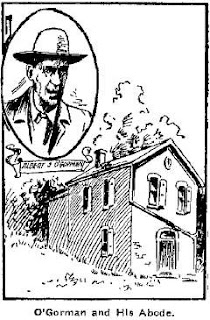 1910
1910Badger Leper Dies
Passes Away After Five Long Years of Affliction
Lived Life of Seclusion in Building Set Apart for Him at the National Soldiers' Home In Milwaukee.
Milwaukee, Wis. — Albert S. O'Gorman is dead. Milwaukee's leper, after nearly five years of retreat in a little brick house on the grounds of the Soldiers' home, is no more. Death came quietly. It was the gradual dissolution of a body wasted by disease, that could no longer find strength to meet the daily strain demanded of it.
O'Gorman was a soldier. He served many years in the regular army, seeing service throughout the east and west. He joined the ranks when the war with Spain broke out, and was one of the foremost in Cuba and the Philippines. It was while with the army in the islands that he contracted the disease which brought his death.
Upon his return from war, O'Gorman entered the regular service in various army posts. Then he was taken ill. He asked a pension, and permission to enter a soldiers' home. The request was readily granted. A monthly income of $72 was allowed him by the government. He was ordered to the Milwaukee national home.
Then, and not till then, did O'Gorman learn the true character of his malady. He was examined by staff physicians, who diagnosed his disease as leprosy. There was no help for him, they said, and preparations were made to arrange for his comfort during his lifetime.
In a corner of the grounds a small brick house, once the home of one of the officials, was set aside for him. It was a two-story structure, with three rooms — a living room, a kitchen and a bedroom. Furniture and books, utensils and regulation clothing were furnished him, and he settled down to live the life of a recluse during the remainder of his days.
That was five years ago. During the intervening time, O'Gorman lived almost happily. Two of his daily meals he prepared himself on the cook stove in his little kitchen. Each day an orderly brought his dinner to him. Tobacco was supplied in abundance. Papers and books were plentiful. He was a deeply religious character, and spent much time reading the Bible, sitting on the low steps of his dwelling, basking in the sun.
To look at the man, one would not realize that he was the victim of the most horrible of diseases. He was inclined to a pleasant personality. None of the horror or fear of the evident indications of leprosy were shown.
O'Gorman suffered especially during the winter time. Cold weather, he complained, increased the steady aches and pains to which he was subjected. During last winter, he failed slowly but steadily. Spring came, and he rallied slightly; but his system was too far gone, and the convalescence proved only temporarily.
O'Gorman was born in Ireland in 1856 It was in 1874 that he came to the United States. He settled near St. Paul, Minn., and it was from there that he was recruited into the regular army.
The case of the patient attracted much attention throughout the country. He was one of two individuals in the United States afflicted with the plague.
Several times the state department and the secretary of war considered transferring his case from Milwaukee, but there were no leper colonies where he might be sent, and it was decided finally, that he could be best cared for in the little brick building in which he made his home.
—Suburbanite Economist, Chicago, Aug. 26, 1910.
No comments:
Post a Comment